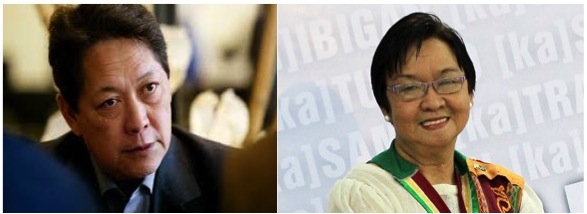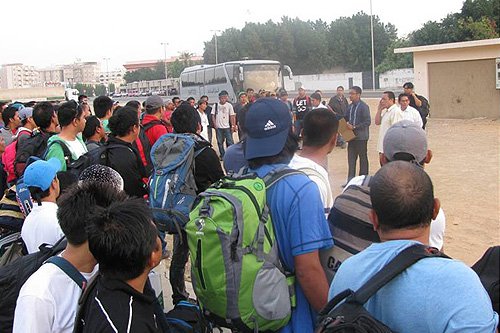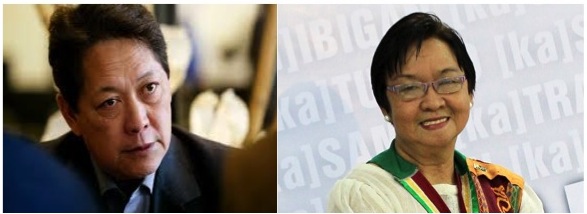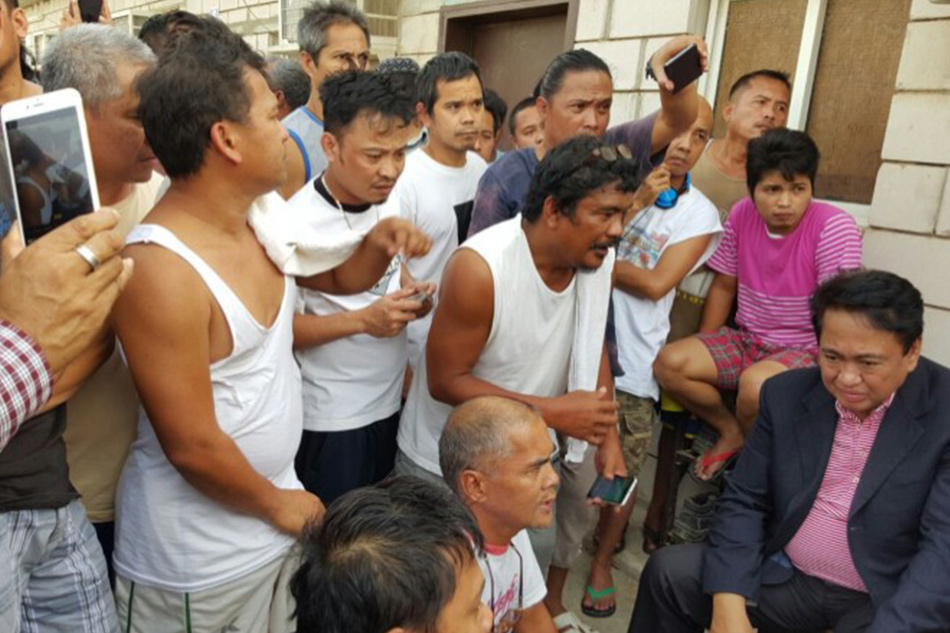(Photos and video by Kilab Multimedia. Do not use without credit.)
A long-running conflict between Lapanday Foods Corporation and agrarian reform beneficiaries in Tagum City, the capital of Davao del Norte, exploded today in a shooting incident that followed a successful attempt by farmers to reclaim their land.
Renante Mantos, chairperson of Hugpong Sa Mga Mag-uuma sa Walhog Compostela (Humawac), the alliance of farmer cooperatives from the Tagum barangays of Madaum and San Isidro, said in a phone interview that guards of Lapanday’s security agency, ACDISA, wounded seven protesters.
Jose Balucos, 42yrs old; Rico Saladaga , Jojo Gomez , Belardo Francisco, Emanuel Buladaco,46 yrs old; Taldan Miparanun,16yrs old; and Joseph Bertulfo, 58yrs old, were rushed to the Davao Regional Medical Center.
Buladaco and Bertulfo are among the 159 direct beneficiaries involved in the protest, according to Mantos, who remains with more than 200 farmers on the reclaimed land.
The others are members of Humawac cooperatives in the Southern Mindanao area, who reinforced the beneficiaries in their efforts to assert their landonwership that a regional trial court and the Department of Agrarian Reform (DAR) in 2011. He said they are waiting for medical updates on their colleagues.
The shooting came two days after some 2,000 agrarian reform beneficiaries and supporters stormed the gates of their land – forcibly taken over by Lapanday in 2011 following the DAR decision.
Festering conflict

Mantos said armed guards of Lapanday entered the encampment past 7 a.m.
He and other protest leaders were holding a dialogue with the guards’ leader, only known by his surname, Vicente, just three meters from the main bulk of protesters when they heard gunshots.
As protesters rushed to aid the fallen, the guards retreated. The other protesters strengthened their barricades and undertook defensive formations.
After the wounded were taken off the encampment, Mantos siad, the guards returned, having replaced their guns with wooden clubs. They challenged the farmers to a brawl but were ignored, Mantos added.
The land dispute in an area barely an hour from President Rodrigo Duterte’s Davao City turf has been festering since 1996 when the Department of Agrarian Reform (DAR) awarded 724 farmers in Madaum nearly 570 hectates of land, mostly planted with banana export crop.
Lapanday just released this statement:
Lapanday Foods Corporation (LFC) denies any involvement in the reported shooting of alleged agrarian reform beneficiaries in Barangay Madaum, Tagum City this morning. Since last week, the company has been seeking police assistance to investigate the presence of armed men who were seen within the areas under Hijo Employees Agrarian Reform Beneficiaries Cooperative 1 (HEARBCO-1). HEARBCO-1 which has acknowledged its existing and valid contracts with LFC has been in conflict with a breakaway group of its former members led by Mely Yu who has been engaging armed men to inflict violence and disrupt operations in the farm. Mely Yu and her group were ousted as officers by the majority of HEARBCO-1 in 2011 and since then, her group has caused severe damage to the cooperative. This internal conflict among the HEARBCO-1 and this breakaway group may be the reason for this latest incident.
Protesters deny the claim of armed men, saying guards fired in the air when they asserted farmers’ right to the land. A Kilab Multimedia photo shows most of the protesters without shirts “to prove they were not armed.”
The timeline of the land dispute also indicates that Lapanday has waged a legal battle with the farmers — and lost its case twice.
A decade of woes

The DAR order was covered by Certificate of Land Ownership Award (CLOA) No.00398239, issued under Transfer Certificate of Title No. C-10527 and registered on 18 December 1996.
The mother cooperative of beneficiaries, the HIJO EMPLOYEES AGRARIAN REFORM COOPERATIVE 1 (HEARCO1), signed a Banana Sales and Marketing Agreement (BSMA) with Lapanday, owned by the Lorenzo family.
Mantos said within two years, many farmer beneficiaries expressed dismay at the low price for their products and the many supposed debts subtracted from their sales income, “kasi di nila alam saan nanggagaling ang utang at walang supporting documents.”
In the ten years, from 1998 to 2008, skirmishes between restive beneficiaries and guards cost two lives and injured several from both sides of the conflict. Farmer leaders were also booted out of work and reinstated only after years of legal battle.
When the contract with Lapanday expired in 2009, the beneficiaries undertook a referendum for future plans. Majority voted to extend the contract, while 159 voted No.
The nay-voters eventually reached an agreement with the mother cooperative, which allowed them to leave, ceding over 145 hectares covered by a document.
“They found a new buyer with better contract — $8 a box from $4 a box paid by Lapanday,” Mantos said.
The DAR ruled in favor of the benificiaries in 2010, upholding their right to the land parcel ceded by the mother cooperative.
Lapanday: no owner – but exerts control
Mantos said the 145 hectares is only one case. Other land parcels are also involved in on-going disputes between beneficiaries and Lapanday, for unjust wages and onerous practices – reminiscent, he said, of the old, feudal plantation setups in the pre-CARP era.
Lapanday denies ownership of the land. But it filed a a case against the new group, covering the lands they tilled. The corporation lost that legal battle too, with the regional trial court ruling in favor of the formers.
Mantos said the agrarian reform beneficiaries were preparing to till the land after victory when “300 Lapanday guards and goons atacked.”
“Tinutukan sila ng baril at pinalayas,” he said. (Guns were pointed at them and they were forced off the land.)
Despite the legal victories, the beneficiaries were kept out of their lands for the next six years.
After seven months of pickets at the gate of Lapanday’s local office, the farmers sought reinforcement from other peasant’s group in the region and entered to reclaim their land on December 9.
Lapanday, in a statement released to Sunstar Davao last month, said:
“Lapanday Foods Corporation clarifies that it does not claim ownership over agrarian reform lands awarded to Hijo Agrarian Reform Beneficiaries Cooperative (HARBCO) and Hijo Employees Agrarian Reform Beneficiaries Cooperative 1 (HEARBCO-1). This is in reaction to a recent gathering of members and sympathizers of these cooperatives at its offices in Davao City,” the statement read. The LFC said these cooperatives remain the absolute owners of these lands and they only want “these cooperatives honor and respect their valid and lawful contracts with LFC that mandate them to sell the bananas produced in their farms to LFC and allow LFC to manage their farms to ensure the quality of their produce.” The company also said in the contracts where HARBCO borrowed funds for its use from LFC, HARBCO and LFC entered into a banana sales and marketing agreement in 1998 and a general framework on farm handling last December 23, 2008. In these contracts, HARBCO committed to exclusively sell bananas produced in its farm to LFC and allow LFC to manage its farms to ensure the export quality of the bananas.
The Kilusang Mambubukid ng Pilipinas – Southern Mindanao said the tagum dispute “is a classic example of what Pres.Duterte refers to as Feudalism.”
The KMP urged Duterte “to walk the talk” and intervene with the farmers upholding the DAR decision.
“We hope that he understands very well that agrarian reform remains myth so long as landlords continously grabbed the lands of nameless farmers. If the farmers will not fight for their rights to survive what assurance can they get from this landlord-dominated government?” said KMP-SMR chairperson, Pedro Arnado.
Lords of the land

The Tagum dispute is an emblem of the struggles that face Filipino farmers decades after the passage of what was pledged to be a landmark law for a comprehensive agrarian reform program (CARP) and congress approval of a successor program, Comprehensive Agrarian Reform Program Extension with Reform (CARPER).
Lapanday is controlled by the Lorenzo clan. Its chief executive officer, Regina Lorenzo, is the sister of Martin Lorenzo, a top executive of the Central Azucarera de Tarlac, the sugar mill of the Cojuangco clan’s sprawling Hacienda Luisita.
A recent outbreak of violence also occurred in Luisita, where beleaguered land workers still have to benefit fully from a final Supreme Court ruling in 2013.
Distribution of land has gone very slowly for beneficiaries. In 2009, the Congressional Policy and Budget Research Department of the House of Representatives, said CARP had a balance of 1.6 million hectares, covering 1.2 million farmer beneficiaries. The environment department, it added, also had nearly 600,000 hectares of land still undistributed to farmer-tillers.
CARPER received a P150 billion budget. But in a 2015 report, the Philippine Center for Investigative Journalism said DAR had still failed to distribute 726, 421 hectares and the DENR still had some 100,000 hectares to go.
Even those who have received land continue to struggle from their lack of access to affordable credit, the continued lack of support mechanisms from government and the market control exercised by agriculture dealers who are also often big landlords.
The hardships often end up with re-concentration of lands, which are then blamed on workers and not on government neglect and collusion with big landowners.
Halting an unjust cycle
 In August, Agrarian Reform Secretary Rafael “Ka Paeng” Mariano, the former representative of militant party-list group, Anakpawis, received President Rodrigo Duterte’s backing on the planned executive order for a halt to land use conversion.
In August, Agrarian Reform Secretary Rafael “Ka Paeng” Mariano, the former representative of militant party-list group, Anakpawis, received President Rodrigo Duterte’s backing on the planned executive order for a halt to land use conversion.
Mariano said the proposed EO should also cover applications for exemption/exclusion of land from the coverage of CARP and other agrarian reform laws and programs.
The practice is currently allowed by Section 20 of the Local Government Code, which authorizes municipal and city councils to reclassify agricultural lands into other uses.
It’s a long, long fight, paid for by tears and blood. Farmers formed the bulk of restive Filipinos who rose up against the dictator Ferdinand Marcos and joined the New People’s Army as big ticket development projects drove them off their lands.
Sixteen years after the fall of the Marcos dictatorship, Bulatlat.com came out with a damning report on CARP: Lands are Back in the Hands of the Lords.
Read Also: Are Filipino Peasants Better Off Now?
It’s now four decades since the EDSA People Power Revolt. Farmers are still shedding blood for lands that are theirs by right.









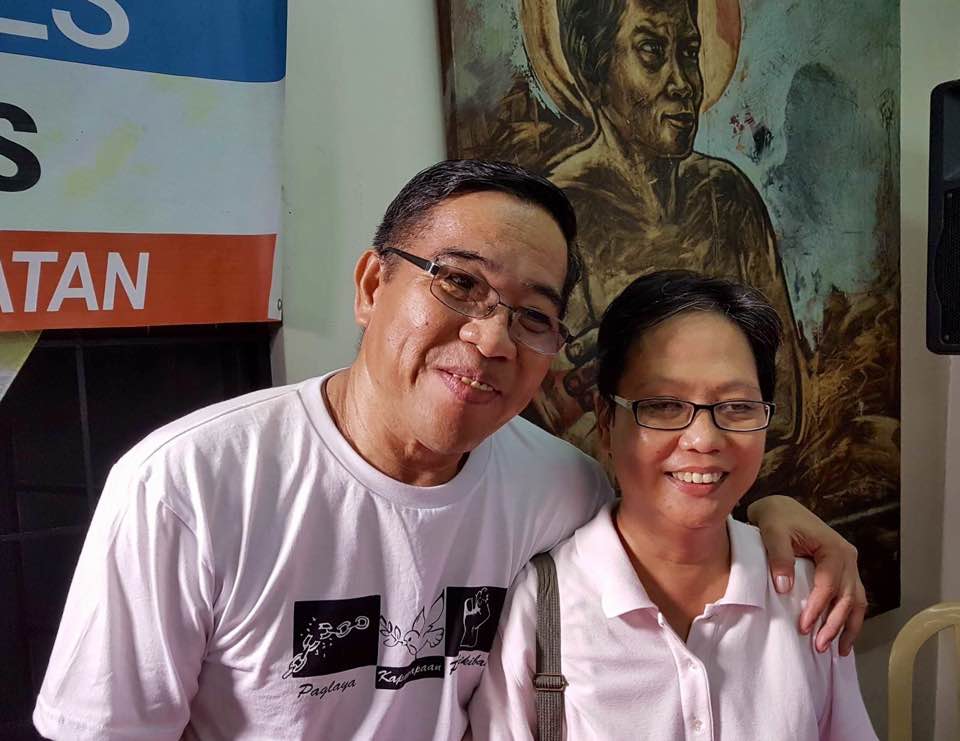 Alexander and Winona Birondo have spent a year waving and gazing each other across rooftops, with court hearings providing their only opportunity for physical closeness. Photo by Obet de Castro
Alexander and Winona Birondo have spent a year waving and gazing each other across rooftops, with court hearings providing their only opportunity for physical closeness. Photo by Obet de Castro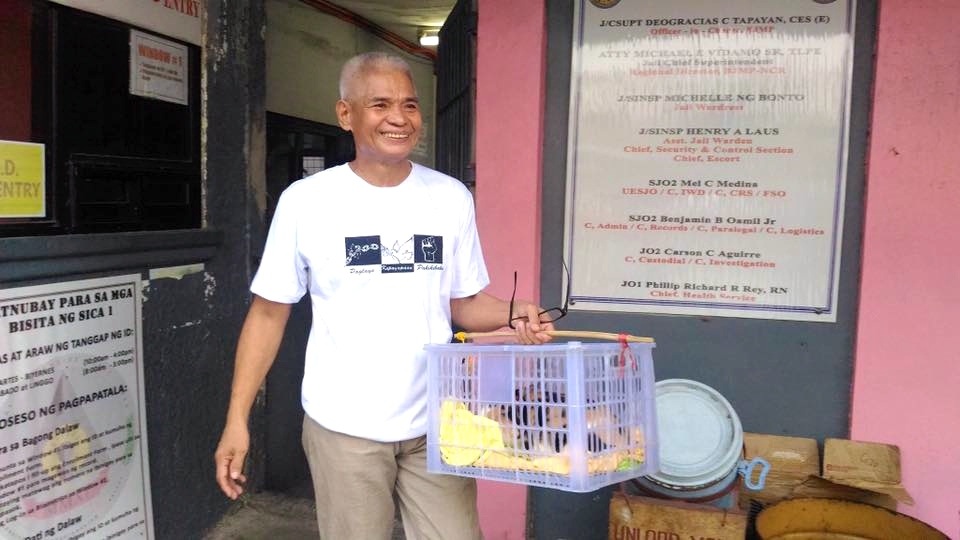 Mid-afternoon of Wednesday, August 17, Christina Palabay holds up a two-page document filled with dense text that detail the 46 criminal raps filed against Tirso Alcantara.
Mid-afternoon of Wednesday, August 17, Christina Palabay holds up a two-page document filled with dense text that detail the 46 criminal raps filed against Tirso Alcantara. The last time Alcantara saw Nica, she was a rambunctious four-year-old visitor to the guerrilla front.
The last time Alcantara saw Nica, she was a rambunctious four-year-old visitor to the guerrilla front. Camp Bagong Diwa hosts the most number of political prisoners.
Camp Bagong Diwa hosts the most number of political prisoners.